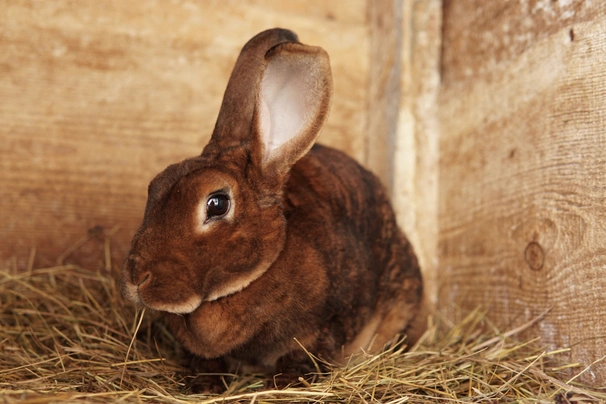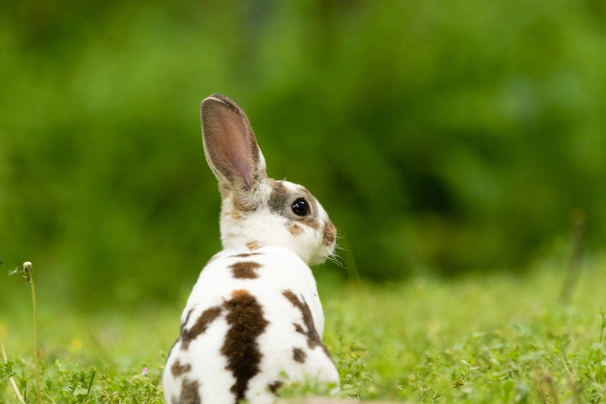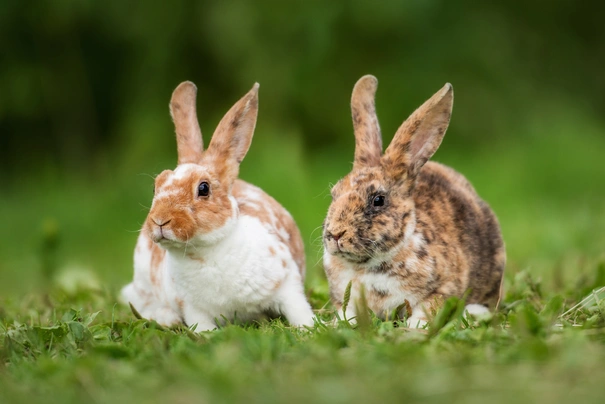Rex
Introduction of the Rex
Unlike many rabbit breeds, the origins of the Rex are certain. The breed made its first appearance in France in the early part of the 20th Century – 1919 to be precise. When wild rabbits displaying a luxuriant, dense coat were bred with domestic animals to take advantage of the mutated gene that caused the unusually plush fur, the Rex breed was born.
The recessive gene that’s responsible for the unusual coat causes the hairs to grow outwards rather than lying flat, while the outer guard hairs are the same length as the undercoat, creating a dense coat that’s not unlike that of a Chinchilla.
History of the Rex
At the end of the second decade of the 20th Century, a litter of wild grey rabbits were born that displayed unusually plush and velvety coats. The outer guard hairs were exactly the same length as the undercoat making a coat that was effectively twice as thick as that of other rabbits.
A breeding programme was quickly established to ‘fix’ this genetic mutation and develop a line of rabbits that had this wonderfully soft and thick coat. The Rex was first shown in public in Paris in 1924 and has been recognised as a standard breed since 1925 in many parts of Europe.
The breed made its way to the US after the Paris International Rabbit Show in 1924 and quickly established itself as one of the most popular breeds of domesticated rabbit. The Rex mutation also appears in cats and rats, however in cats it results in a wavy coat that in some cats is thick, and in others is very fine. In Rex rabbits the coat is always thick.
These days, the Rex is kept as a companion animal and as a show rabbit. It is also used for meat and fur production.
Appearance of the Rex
- Main colourways: white, blue, lilac, black, broken and chocolate
- Average weight: 3.4 – 4.8kg
The coat of the Rex should be between ½ - 7/8 of an inch long and should be dense, thick and velvety, standing upright from the skin. The mutated gene can also cause the fur to curl in some areas – usually where the fur is a little longer – such as behind the ears. Normally, this curling or waving is barely noticeable. The mutation also means that Rex rabbits sometimes have shortened whiskers or no whiskers at all.
The body of the Rex is compact and rounded although it can have a slightly wider head than other rabbits. The females have a large dewlap and the toenails are always the same colour as the fur on its feet. Its ears are in proportion and held upright. The Rex comes in many different colours and patterns including white (with red or blue eyes), Chinchilla, black, blue, lilac, broken, Californian, chocolate and sable.
Temperament of the Rex
The infamous book ‘Burke’s Backyard’ states that the Rex is one of the most intelligent breeds of rabbit. It displays a very strong maternal instinct and Rex does have been used as foster mothers for rejected kits to great effect. Because of its higher-than-average intelligence and caring nature, you can keep two Rex together quite happily.
The Rex is most active at night and in the morning, and although his activity levels are described as ‘moderate’, he’s an excellent jumper and will clear a three-foot obstacle with ease. He will probably prefer to rest during the day, although he will enjoy human company and will be playful. In fact, because of his higher-than-average intelligence and relaxed, fairly docile personality the Rex is often likened to a cat.
Rex rabbits are easy to litter train and as such make excellent house rabbits. A word of warning though – cedar-based litter should be avoided as it can be harmful to the animal. They can also be trained to come to their owner on command and stand on their hind legs. Like most animals though, a Rex will not perform without the necessary motivation so if you want to train your pet then a ready supply of his favourite treats is a must.
As one of the more gentle breeds of rabbit, the Rex is an excellent choice of pet for families with children. Any youngsters must however, be well-educated in the correct handling of their rabbit friend.
Health of the Rex
The clever Rex is one of the hardiest breeds of domesticated rabbit so is plagued with few genetic conditions, although they do seem predisposed to sore hock.
As a rabbit’s teeth grow continuously care should be taken to feed him plenty of roughage and tough, fibrous plant material that will keep his teeth healthy and worn down. Overgrown molars and enamel spurs can cause lots of problems in the mouth, not least abscesses and an inability to eat. Any suspected dental problems should be dealt with swiftly by a vet.
Unless you want to breed from a doe, it’s worth considering spaying female rabbits as they can develop uterine cancer, and all rabbits should be regularly wormed and treated for fleas and ticks. It’s also vital that you vaccinate your pet against myxomotosis and viral haemorrhagic disease – both potentially fatal conditions spread by infected animals, housing, bedding and utensils.
Caring for the Rex
Rex rabbits make excellent house rabbits as they can be easily trained to use a litter tray. If you are to keep your rabbit indoors then anything you don’t want chewing such as cables, wires and shoes should be moved out of reach. He should also be provided with an indoor cage or quiet area where he can go to rest and get out of the way.
If you’re going to keep your pet outdoors then he needs a weather and waterproof hutch that’s big enough for him to hop about and stand up in. It should be placed out of windy corners and full sun and should be impervious to predators. It should also have a covered area where he can sleep or get out of the worst of the weather. A cover can be placed over the front of the hutch if the weather becomes very harsh. The hutch can also be kept in a well-ventilated shed.
All rabbits should be fed high-quality hay and rabbit pellets, as well as plenty of fibrous green vegetables such as cabbage, kale, dandelions and nettles, all of which will help keep his teeth worn down. Fresh, clean drinking water should be available at all times.


